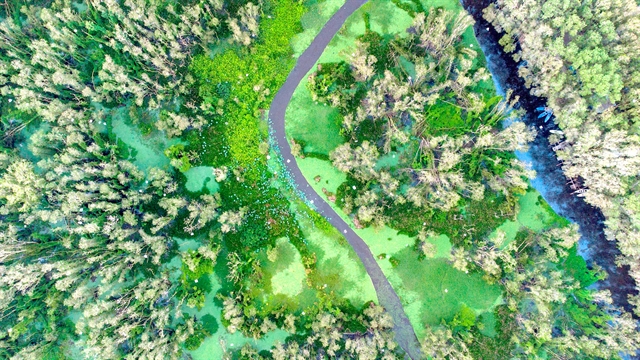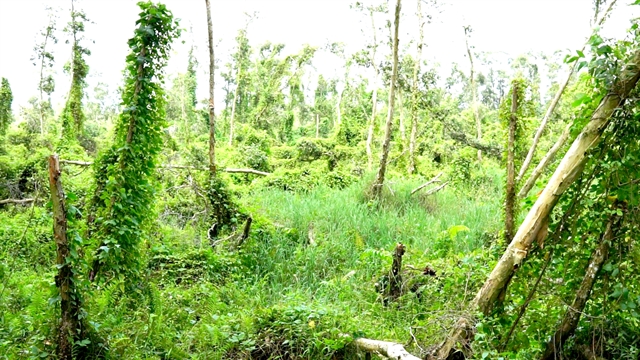 Environment
Environment

 |
| Trà Sư Wetland reserve in An Giang Province. Photos courtesy of WWF-Viet Nam |
AN GIANG — The Department of Agriculture and Rural Development of southern An Giang Province, in collaboration with WWF-Vietnam, has launched a restoration project for the wetlands floodplains around Trà Sư Wetland Reserve, boosting natural-based solutions for biodiversity conservation.
WWF-Vietnam said the project will focus on identifying and demonstrating nature-based solutions (NbS), which have the potential for large-scale expansion and investment throughout the upper Mekong Delta region. This initiative contributes to the overall goal of preserving the biodiversity of freshwater ecosystems in Việt Nam while ensuring sustainable livelihoods for the local communities.
Trà Sư Wetland Reserve (TSWR) – which is part of Việt Nam's protected areas – was recognised as a Melaleuca Landscape Protection Area in 2005. It has a core zone area of 845ha and a 1,100ha-buffer zone.
This region annually receives floodwater from the Mekong River during the rainy season to maintain the seasonal inundation (rotating wet-dry seasons) of a natural wetland.
The primary landscapes of Trà Sư WR are melaleuca forests, swamps, grasslands and diversified flora including 140 tree species, of which melaleuca is dominated and water-fern covers the water's surface.
The reserve has at least 70 bird species, including two endangered species listed in Việt Nam's Red Book – the painted stock (Mycteria leucocephala) and the oriental darter (Anhinga melanogaster).
There are 11 species of mammals found living in the reserve, including rare bats, and 25 species of reptiles and amphibians.
The forest area is a rich habitat for 10 native fish species and 13 migratory fish species during the flood season, including two critically endangered fish species such as the clown featherback (Chitala ornata) and the white walking catfish (Clarias batrachus).
The project ‘showcasing nature-based solutions to restore wetlands and the natural processes of the Mekong Delta (or Mekong NbS’) is developed and executed by WWF-Vietnam and the provincial Department of Agriculture and Rural Development, with the support of the Industria De Diseno Textil Group from Spain.
The project aims to enhance nature's resilience by preserving and restoring biodiversity in flooded areas and developing flooded-based livelihood models in the upper region of the Mekong Delta.
Nature-based and resilient farming solutions and hi-tech farming practices bring multiple benefits to the local inhabitants and agricultural ecosystems in An Giang Province, establishing a scientific foundation for replication throughout the entire Mekong Detal region in Việt Nam.
In supporting to the Vietnamese Government’s development plan, WWF has offered several nature-based livelihood models in the region, such as flooded rice farming in combination with fish and ducks, or indigenous fish farming during the flood season, and lotus plantation with fish and shrimp farming.
 |
| Rich grass and tree species are well protected in the Trà Sư Wetland Reserve in An Giang Province. The area was recognised as a Melaleuca Landscape Protection Area in 2005. |
These aim to extend the duration of floodwater retention in floodplains, increase sediment deposition, improve soil fertility, prevent diseases from the previous crops, and refill groundwater while maintaining water flows in the Mekong Delta in dry season.
WWF-Vietnam said it will work with the local department in implementation of number of conservation initiatives and nature-friendly agricultural models in the Trà Sư WR.
Văn Ngọc Thịnh, CEO of WWF-Vietnam, said: "The sustainability of the Mekong Delta is facing numerous significant challenges such as climate change, hydropower plant development, large-scale irrigation projects in the upper Mekong river, as well as over-exploitation of natural resources, and unsustainable agricultural and aquacultural practices in the Delta.
“We need urgent actions, effective solutions and close cooperation among the public sector, private sector, local communities and international partners to address these issues.
"The Việt Nam Government’s Resolution 120 allows us to implement nature-based solutions in the Mekong Delta. Improved rice cultivation practices would help boost export revenue and ensure food security but also help balance ecological factors, protect the environment, provide natural products, protect public health and establish sustainable product brands."
Mekong NbS, which will run until 25, would reserve smooth ways for natural flows and sediment deposition in buffer zones through positive environment-friendly activities in the core zone and in the buffer zones of Trà Sư WR, according to WWF-Vietnam.
The project will also support An Giang Protection and Special Use Forest Management Board by planting 60ha native forest species and restoring 100ha of degraded forest, habitats and native species through appropriate and efficient hydrological management strategies for each sub-zone, protecting and monitoring biodiversity in the core area.
Meanwhile, flooded-based livelihood models in the buffer zone will bring economic and environmental benefits to local communities in the upper region of the Mekong Delta.
The successful nature-based solutions and practices in the region would help expand the restoration of wetland habitats and natural processes.
Flooded-based livelihood models, climate change adaptation, and environmentally friendly practices in An Giang and upstream provinces of the Mekong Delta, such as Đồng Tháp and Long An provinces will be systematised for replication in areas with suitable natural conditions and community participation.
WWF-Vietnam said the project will also help connect nature-based products with markets and sustainable supply chains, serving as a base condition in luring investments from private sector for promoting the development of livelihood models tailored to each ecological zone across the upper delta region. VNS